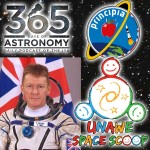Podcaster: Richard Drumm
 Title: Space Scoop: British Astronaut Blasts Off to the International Space Station
Title: Space Scoop: British Astronaut Blasts Off to the International Space Station
Organization: 365 Days Of Astronomy
Link : astrosphere.org ; http://www.spacescoop.org/en/scoops/1559/british-astronaut-blasts-off-to-international-space-station/
Description: Space scoop, news for children.
Bio: Richard Drumm is President of the Charlottesville Astronomical Society and President of 3D – Drumm Digital Design, a video production company with clients such as Kodak, Xerox and GlaxoSmithKline Pharmaceuticals. He was an observer with the UVa Parallax Program at McCormick Observatory in 1981 & 1982. He has found that his greatest passion in life is public outreach astronomy and he pursues it at every opportunity.
Today’s sponsor: This episode of “365 Days of Astronomy” is sponsored by — no one. We still need sponsors for many days in 2015, so please consider sponsoring a day or two. Just click on the “Donate” button on the lower left side of this webpage, or contact us at signup@365daysofastronomy.org.
Transcript:
This is 365 Days of Astronomy. Today we bring you a new episode in our Space Scoop series. This show is produced in collaboration with Universe Awareness, a program that strives to inspire every child with our wonderful cosmos.
Today’s story is:
British Astronaut Blasts Off to the International Space Station
One satellite in orbit around Earth is particularly special – the International Space Station. It’s the largest satellite ever made, with a mass of almost 420,000 kilograms!
The International Space Station (called the ISS) can host up to ten people at the same time. There are currently six people living and working on this orbiting laboratory. One of those lucky six, a flight engineer, is Major Tim Peake, the first Briton in space in over 20 years! There have been 7 British citizens in space so far.
On December 15th, 2015, Tim was strapped into a Soyuz spacecraft and blasted into space. After an eight-hour flight, the spacecraft arrived at the ISS.
There were a few problems on arrival, the Kurs automatic docking navigation system didn’t work right, but thanks to manual override and the “Right Stuff” talents of Commander Yuri Malenchenko, Tim and NASA astronaut Tim Kopra arrived at the station safely, only 10 minutes late.
Now the hard work begins for Tim. Over the next six-months he will work on his personal mission called Principia, celebrating “Philosophiae Naturalis Principia Mathematica”, or “The Mathematical Principals of Natural Philosophy”, the masterwork of the famous British scientist Isaac Newton who discovered calculus and who first described classical gravitational mechanics.
When he derived Kepler’s laws of planetary motion from his own law of universal gravitation, and then turned around and used those same principals to describe the orbits of comets, Earth’s tides and the precession of the equinoxes, he obliterated the last doubts that anybody had that the Earth orbited the Sun.
To this day we use Newtonian dynamics to steer our spacecraft around the solar system, it works THAT well.
Now where was I?
Oh yeah! Tim Peake!
As part of his important mission Tim will carry out dozens of experiments for researchers on Earth, such as growing blood vessels in space, looking at how the brain adapts to stressful situations, and trying to make new types of metal alloys in weightlessness.
Some of these experiments are intended to improve our understanding of fundamental science, and some will demonstrate new applications of science and technology. A large educational program will inspire and involve children & students with computer coding, fitness regimes and lessons from space with Tim as the instructor.
Tim will also be testing out the technology that will help us explore the Solar System in the future, by controlling robots on Earth from orbit! The technology could be used to drive robots around the surface of Mars while astronauts are orbiting the Red Planet!
Just as there is a high orbit of Earth called a geostationary or geosynchronous orbit, there is an “aerostationary” orbit for Mars where the orbiting satellite will approximately hover over one spot on the surface.
It’s from an orbit like this that future astronauts may control Mars surface robots from the relative safety and comfort of their spaceship.
To be sure, we can do this now, after a fashion, from Earth, but by doing it from Mars orbit we can eliminate the many minutes long communication lag times and the robot will get much more work done. It can do things like preparing a surface habitat for human occupation, or just plain old exploration!
Here’s the cool fact:
If you think it’s hard to stay in shape on Earth, try keeping fit in weightlessness. When you never have to stand up or lift anything, it can be very difficult. To keep healthy Tim Peake plans to run a marathon while on-board the ISS (that’s 42 kilometers!).
Thank you for listening to 365 Days of Astronomy!
End of podcast:
365 Days of Astronomy
=====================
The 365 Days of Astronomy Podcast is produced by NUCLIO. Audio post-production by Richard Drumm. Bandwidth donated by libsyn.com and wizzard media. You may reproduce and distribute this audio for non-commercial purposes. Please consider supporting the podcast with a few dollars (or Euros!). Visit us on the web at 365DaysOfAstronomy.org or email us at info@365DaysOfAstronomy.org. This year we celebrate cosmic light as light is our info messenger in the universe. Join us and share your story to celebrate the International Year of Light. Until tomorrow! Goodbye!

